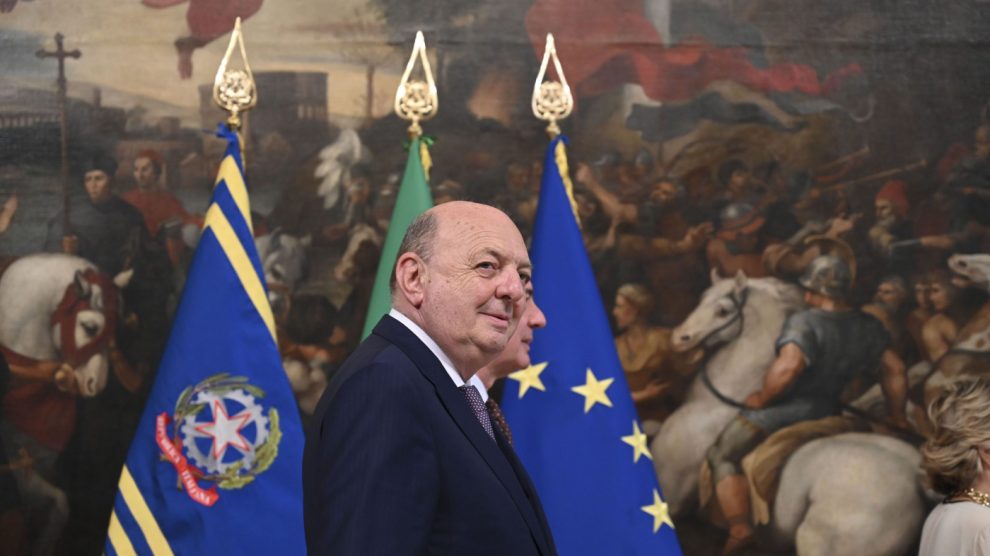Gilberto Pichetto Fratin has become Minister of the Environment and Energy Security in Giorgia Meloni’s government, inheriting one of the most challenging issues on Italy’s plate: the energy crisis.
- A graduate of Economics from the University of Turin and a member of Silvio Berlusconi’s Forza Italia party, he was deputy minister for Economic Development in Mario Draghi’s government.
What’s in a name? Mr Pichetto Fratin’s ministry, previously known as that of the Ecological Transition, changed its name to Environment and Energy Security. He told Il Giornale that he refrained from offering formal interpretations of this name change but suggested the new version “entails a long-term significance compared to the previous one.”
- Other ministries changed names, too, and some of the new designations are somewhat nationalistic. For instance, Economic Development has become “Business and Made in Italy,” Agriculture now includes “Food Sovereignty,” and “Equal Opportunities” now follows “Family” and “Natality.”
Transition without ideology. “I understand those who make slogans and take sides [but] we have a precise duty: to give solutions and not to campaign,” said Mr Pichetto Fratin, who is corporate-minded and pro-nuclear. Compared to his predecessor Roberto Cingolani, it’s fair to expect more attention to energy security and supply rather than ecology or emissions.
- The dossiers and duties of each minister will become clearer in the coming days as the relevant delegations are assigned to them.
Let’s talk about cars and the shift to electric vehicles, considering the EU’s goal of banning the sale of internal combustion engines by 2035 and the panic it’s causing in Italy’s automotive sector – enough for some to believe the tide is turning on that measure, perhaps in time for the 2024 European Parliament elections.
- Bigwigs such as Carlos Tavares, CEO of Stellantis, have been sounding the alarm and blasting “much dogmatism, little pragmatism” Brussels.
An ally in the making. Chances are the new Environment Minister will be more attuned to the industry’s woes than his predecessor. At the Ministry for Economic Development, he was involved in the dossier. And he’s from Turin, where the car industry is intertwined in the very fabric of the city.
- As he told Il Giornale, the problem is clear. “These are overall assessments to be made […] after we check on the companies’ ability to reach the 2035 target [while also considering] the critical supply of microchips and batteries. We need to be able to reason about when and how to reach it without forgetting biofuels, hydrogen and sector-specific derogations,” he said.
Still, Cingolani will stay on as an advisor, free of charge. His permanence is part of the Draghi-Meloni handover package, as he will aid in finishing the work on the EU’s gas price cap and on expanding Italy’s non-Russian gas supplies.
- The competence and respect that Mr Cingolani enjoys in Brussels are arguably even more important than his experience. He will accompany his successor to Tuesday’s European Energy Council.
- (side note: the first of Italy’s two new regasification units is being placed in Piombino amid nimby opposition, including from the city’s mayor, who in turn is a representative of PM Meloni’s party).
Gas matters. Italy is the European country that secured the largest (by far) alternative gas supplies – amounting to 13 billion cubic metres per year by 2023, compared to Germany’s 2.6 billion agreements (by 2026, mostly). This imbalance, recently highlighted by Bruegel, explains Rome and Berlin’s differing approaches in Brussels.
- Germany is insecure about supply and calls for “common purchases” while dragging its feet on the price caps for fear of reducing supplies, preferring instead to foot the bills of companies and families using its immense public finance capacity.
- Italy, on the other hand, has no interest in joint European purchases because it knows it can count on Eni’s contracts. And it’s unsure it can compensate consumers for a long time, given the public debt, so it calls for a strict price cap.




